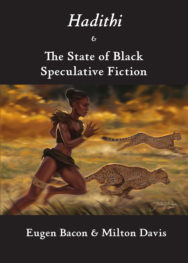‘Hadithi is many wonderous things including a journey into black ancestry.’
As part of the Year of Scotland’s Stories, we are running a series of Responses on BooksfromScotland, commissioning writers to respond to books from the Publishing Scotland membership, engaging with work in different ways. This month photographer Nikki Kilburn considers the academic anthology Hadithi and the State of Black Speculative Fiction.
Hadithi & The State of Black Speculative Fiction
By Eugene Bacon & Milton Davis
Published by Luna Press Publishing
Eugen Bacon and Milton Davis define black speculative fiction as a genre that refuses to conform to our understanding of genre in the classical form. In part one of their collaboration, they present a catalogue of black authors who disrupt narratives that identify and categorise history, culture, and experience with the dominant white perspective. Among them Toni Morrison and Octavia Butler tell the stories they wanted to see themselves in and read as relatable to their identity. In alliance with a community of writers, their characters normalise and centre the black experience, refuting the othering of their identity and representation. They defy hard-boiled compliance with what constitutes science fiction, fantasy and horror, creating their own classifications rooted in tradition, culture, futurism, and black visionary. Throughout this dive into this vibrant pool of succulent nutrients, I noted anthologies and writers I wasn’t familiar with to and want to explore. I now have a list of new wave treats to indulge my appetite; sharing is caring so I urge you to get stuck in too.
Part Two of Hadithi is a stunning collection of seven short stories. Bacon ends each of her stories with a part of herself. She gifts us the story within the story. Her disclosure of the ‘rage’ she felt when she lost her own sister to AIDS is embodied in ‘Still She Visits’. The spirit presence of the protagonist Segomotsi’s sister Mokgosi in her counselling sessions is, Segomatsi qualifies, her psyche coming to terms with Mokgosi’s death. She is expressing the horror of bereavement by normalising the experience of the spectre as a natural part of grief and experience after the death of a loved one.
The bond between the sisters charts back to childhood when together they held up the sky, Mokgosi the elder lighting the way for Segomotsi’s transition through girlhood. Memories and metaphors that sink into the biology of our being act as a soothing agent for the geographical distance that migrate between two worlds, Botswana, and Australia. Reflecting Bacon’s lived experience, it echoes the occult wisdom of transforming our narratives into a call and response between ourselves and the stories we create.
Through my writing and creative practice as a photographer, I am often working in reverse, putting pen to paper after creating a visual to discover my narrative. It’s a purposeful process of feedback from the parts of myself that have been shadowed by a history of migration and a consequent search for home. Loss is a guiding part of the practice of finding neurological ways to come to terms with what can’t be replaced. I listen and follow the inner signs that show me how to attune to the voices of loved ones calling out from the spirit realm, leading me through the labyrinth into my future self.
In ‘Carnival’ Milton Davis transports us to a Nigeria of the future where DJs reign supreme as influencers. The protagonist Antwon, a code hacker, uses his fame and influence as a DJ to disrupt state control of information. A revolutionary in an apocalyptic world, where life is lived on the ‘Inside’ and the ecology of the ‘Outside’ is a vulnerable alien environment to human interaction. An urban cyberpunk thriller, Milton illustrates a reality that may not be too far in the future where every aspect of our existence is determined and monitored by tech, digital entertainment platforms condition our recreational choices, and where there is a neurotic dependency on universal cryptocurrency. It may be a while however before we have flying cars.
I hurtled through the story stimulated and jarred by proximity to the depicted near future. Like many people, the digital world overwhelms my daily life. One of my coping strategies is falling into fantasy, longing to live an analogue life where I’m not dependent on technology to earn a living and stay connected to the world. Film photography is a small way I can disconnect. Not knowing exactly what has been captured allows me to detach from the immediacy of automation, immersing in waiting, and then enjoying the darkroom process that risks failure. In this unknown landscape, I accept imperfection, depend on my instincts, and lean into the totemic whispers.
Hadithi is many wonderous things including a journey into black ancestry. Bacon’s, ‘The Water’s Memory’ reframes the dogmatic western perspective of arranged marriage where choice is central to the female experience. Joy and curiosity rise from the page, softly thundering a legacy of female voices whose stories have been told for them, not by them. The inheritance of colonialism posits a hybrid identity of opportunity and disease. The incandescent daughter Adaeze goes to a convent school while environmental destruction valleys alongside an innate ancestral relationship with nature. It resonates in ‘Baba Kelp’ and Davis’s ‘Swarm’ mythology, where fantasy and science fiction illustrate the life, death, rebirth cycle, and characters come together to fight with warrior strength to overcome and save people and the land.
Reprisal saunters then gallops through Davis’s ‘Down South’, set in post-war America in the ‘20s. An unassuming war veteran spectacularly annihilates bodies of white supremacy, in a classic superhero tale.
This collection is political, blackness centred by black writers. They push beyond boundaries, their writing cannot be pinned down or simply indexed as otherworldly; they are restating their genre, rewriting history and the future.
Hadithi & The State of Black Speculative Fiction by Eugene Bacon & Milton Davis is published by Luna Press Publishing, priced £13.99.
Nikki Kilburn is a photographer interested in exploring how identity and lived experience creates complex realities. Her writing and photography has featured in numerous publications and exhibitions among them are Glasgow Gallery of Photography, Juice Magazine, She is Fierce, Audacious Women, Ruthless Magazine, Art Hoe Collective and The View Magazine.
ALSO IN THIS ISSUE

 Leela Soma on The Kavya Prize
Leela Soma on The Kavya Prize
‘The Kavya Prize will empower them to raise their voices, tell their stories and reach a wider audie …

 From Murky Waters We Rise
From Murky Waters We Rise
‘i remember that i love you now as much as i did when we first met and i wish i had told you that on …













